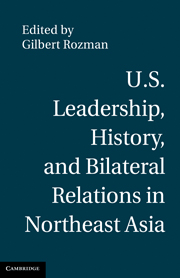
- Cited by 1
-
Cited byCrossref Citations
This Book has been cited by the following publications. This list is generated based on data provided by Crossref.
Hur, Mi-yeon 2018. The Six-Party Talks on North Korea. p. 257.
- Publisher:
- Cambridge University Press
- Online publication date:
- March 2011
- Print publication year:
- 2010
- Online ISBN:
- 9780511760945




